Related Research Articles

A touchdown is a scoring play in gridiron football. Scoring a touchdown grants the team that scored it 6 points. Whether running, passing, returning a kickoff or punt, or recovering a turnover, a team scores a touchdown by advancing the football into the opponent's end zone. More specifically, a touchdown is when a player is in possession of the ball, any part of the ball is in the end zone they are attacking, and the player is not down.
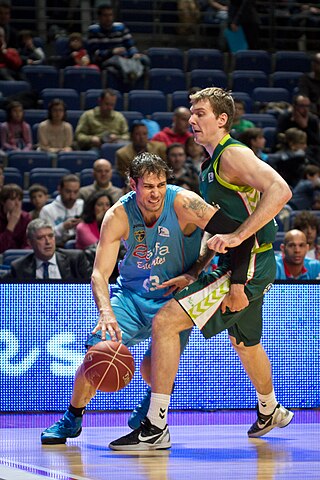
In basketball, a personal foul is a breach of the rules that concerns illegal personal contact with an opponent. It is the most common type of foul in basketball. A player fouls out on reaching a limit on personal fouls for the game and is disqualified from participation in the remainder of the game.
In various sports, a professional foul is a deliberate act of foul play intended to bring about an advantage for the perpetrator's team. Professional fouls are usually committed to prevent an opponent from scoring.
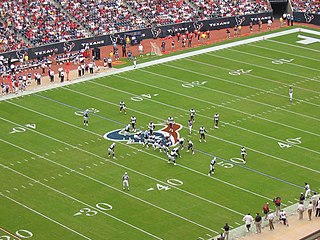
Gameplay in American football consists of a series of downs, individual plays of short duration, outside of which the ball is or is not in play. These can be plays from scrimmage – passes, runs, punts or field goal attempts – or free kicks such as kickoffs and fair catch kicks. Substitutions can be made between downs, which allows for a great deal of specialization as coaches choose the players best suited for each particular situation. During a play, each team should have no more than 11 players on the field, and each of them has specific tasks assigned for that specific play.
In gridiron football, clock management is an aspect of game strategy that focuses on the game clock and/or play clock to achieve a desired result, typically near the end of a match. Depending on the game situation, clock management may entail playing in a manner that either slows or quickens the time elapsed from the game clock, to either extend the match or hasten its end. When the desired outcome is to end the match quicker, it is analogous to "running out the clock" seen in many sports. Clock management strategies are a significant part of American football, where an elaborate set of rules dictates when the game clock stops between downs, and when it continues to run.

In sports, an ejection is the removal of a participant from a contest due to a violation of the sport's rules. The exact violations that lead to an ejection vary depending upon the sport, but common causes for ejection include unsportsmanlike conduct, violent acts against another participant that are beyond the sport's generally accepted standards for such acts, abuse against officials, violations of the sport's rules that the contest official deems to be egregious, or the use of an illegal substance to better a player's game. Most sports have provisions that allow players to be ejected, and many allow for the ejection of coaches, managers, or other non-playing personnel. In sports that use penalty cards, a red card is often used to signal dismissals. In some sports, another player is permitted to enter the game in place of the player who has been ejected, but in others the team is required to continue the game with a reduced number of players.

The 1978 NFL season was the 59th regular season of the National Football League. The league expanded the regular season from a 14-game schedule to 16 games, which it remained in place until 2021 when it was increased to 17 games. Furthermore, the playoff format was expanded from 8 teams to 10 teams by adding another wild card from each conference. The wild card teams played each other, with the winner advancing to the playoff round of eight teams.

In the sport of association football, fouls and misconduct are acts committed by players which are deemed by the referee to be unfair and are subsequently penalised. An offence may be a foul, misconduct or both depending on the nature of the offence and the circumstances in which it occurs. Fouls and misconduct are addressed in Law 12 of the Laws of the Game. A foul is an unfair act by a player, deemed by the referee to contravene the game's laws, that interferes with the active play of the match. Fouls are punished by the award of a free kick to the opposing team. A list of specific offences that can be fouls are detailed in Law 12 of the Laws of the Game ; these mostly concern unnecessarily aggressive physical play and the offence of handling the ball. An infringement is classified as a foul when it meets all the following conditions:
- It is committed by a player ;
- It occurs on the field of play;
- It occurs while the ball is in play;
- It is committed against an opponent.
In sports strategy, running out the clock is the practice of a winning team allowing the clock to expire through a series of preselected plays, either to preserve a lead or hasten the end of a one-sided contest. Such measures expend time but do not otherwise have a tactical purpose. This is usually done by a team that is winning by a slim margin near the end of a game, in order to reduce the time available for the opposing team to score. Generally, it is the opposite strategy of running up the score.

In basketball, a flagrant foul is a personal foul that involves excessive or violent contact that could injure the fouled player. A flagrant foul may be unintentional or purposeful; the latter type is also called an "intentional foul" in the National Basketball Association (NBA). However, not all intentional fouls are flagrant fouls, as it is an accepted strategy to intentionally commit a foul in order to regain possession of the ball while minimizing how much time elapses on the game clock.

In basketball, a foul is an infraction of the rules more serious than a violation. Most fouls occur as a result of illegal personal contact with an opponent and/or unsportsmanlike behavior. Fouls can result in one or more of the following penalties:

Unsportsmanlike conduct is a foul or offense in many sports that violates the sport's generally accepted rules of sportsmanship and participant conduct. Examples include verbal abuse, taunting of an opponent or a game official, an excessive celebration following a significant play, or feigning injury. The official rules of many sports include a general provision whereby participants or an entire team may be penalized or otherwise sanctioned for unsportsmanlike conduct.
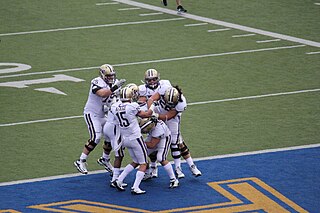
In gridiron football, touchdown celebrations are sometimes performed after the scoring of a touchdown. Individual celebrations have become increasingly complex over time, from simple "spiking" of the football in decades past to the elaborately choreographed displays of the current era.
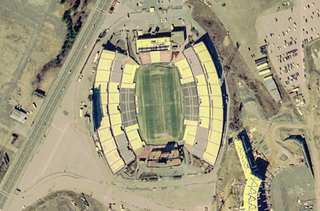
The Snowplow Game was a regular-season game played between the Miami Dolphins and New England Patriots on December 12, 1982, at Schaefer Stadium in Foxborough, Massachusetts. Due in part to icy conditions, the game remained scoreless until late in the fourth quarter, when the snowplow operator was called in to clear a spot on the snowy field specifically for New England kicker John Smith so he could kick the game-winning field goal to give the Patriots a 3–0 win.
Delay of game is an action in a sports game in which a player or team deliberately stalls the game, usually with the intention of using the delay to its advantage. In some sports, the delay of game is considered an infraction if it is longer than that permitted according to the game's rules, in which case a penalty can be issued. Some sports that have a delay of game penalty are American football, Canadian football, ice hockey and association football.
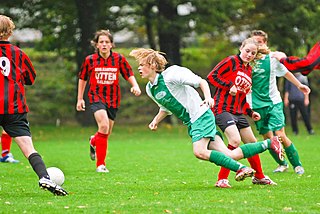
In sports, a foul is an inappropriate or unfair act by a player as deemed by a referee, usually violating the rules of the sport or game. A foul may be intentional or accidental, and often results in a penalty. Even though it may not be intentional, fouling can still cause serious harm or injury to opposing players, or even their own players if unaware of their surroundings during particular situations on sports. Fouls are used in many different sports. Often own teammates can clash and foul each other by accident, such as both going for and with eyes on a ball in AFL. Strategical fouls violate the traditional norms of cooperation and agreement to the essential rules and regulations of the game, or are perhaps not part of the games at all.

In gridiron football, a penalty is a sanction assessed against a team for a violation of the rules, called a foul. Officials initially signal penalties by tossing a bright yellow colored penalty flag onto the field toward or at the spot of a foul.

In American football, the Snowball Game was the November 11, 1985 National Football League game between the San Francisco 49ers and Denver Broncos. It was notable for a play in which spectators at Denver's Mile High Stadium disrupted a 49ers' field goal attempt by throwing snowballs from the stands.
In gridiron football, a safety is scored when the ball becomes dead behind the goal line of the team in possession of the ball. In most instances, a safety is scored by the defensive team when the ball-carrier of the team in possession of the ball retreats into his own end zone and is tackled or steps out of play from the end zone. A safety can also occur when the offensive team loses control of the ball and it goes out of play from the end zone. Due to their uncommon nature, there are a number of records relating to safeties.

The 2018 NFC Championship Game was a National Football League (NFL) game played on January 20, 2019, to determine the National Football Conference (NFC) champion for the 2018 NFL season. The visiting Los Angeles Rams defeated the New Orleans Saints 26–23 in sudden death overtime to advance to their first Super Bowl since the 2001 season. The outcome, however, was mired in controversy because of unpenalized pass interference committed by Rams cornerback Nickell Robey-Coleman on Saints wide receiver Tommylee Lewis near the end of regulation, which would be nicknamed the "NOLA No-Call".
References
- 1 2 3 Skurski, Jay (December 19, 2022). "15 yards for snowballs? Turns out, that's not covered in the NFL rule book" . Buffalo News. Archived from the original on 2022-12-20. Retrieved 2022-12-20.
- ↑ Wilson, Josh (2023-01-03). "NFL insider reveals options league is considering for Bengals-Bills resumption". FanSided. Retrieved 2023-01-03.
- ↑ Florio, Mike (January 21, 2019). "Commissioner has authority to take action over Rams-Saints outcome, in theory". MSN. Archived from the original on Jan 22, 2019. Retrieved January 21, 2019.
- ↑ "Unusual Play Explained". New York Times. 1 December 1918. Archived from the original on 10 August 2022. Retrieved 10 August 2022– via newspapers.com.
- ↑ Watkins, Ed (January 2, 1954). "Rice beats Alabama 28–6, Moegle is Star". The Tuscaloosa News. p. 1. Retrieved January 3, 2011– via Google News.
- 1 2 The definition in the 2016 NFL Rulebook is within Rule 12, Section 3 ("Unsportsmanlike Conduct"). Article 2 addresses "successive or repeated fouls" and Article 3 addresses unfairly interfering with play.
- ↑ Kevin Seifert (2016-10-18). "How the NFL prevents teams from using penalties to win games". ESPN. Retrieved 2017-01-06.
- ↑ Matt Maiocco (2016-11-15). "NFL Acts Against 49ers' Holding Strategy". NBC. Retrieved 2017-01-06.
- ↑ Brian Tinsman (2016-11-27). "Ravens' Take Safety Play Wasn't a 'Palpably Unfair Act'". CBS. Retrieved 2017-01-06.
- ↑ "NFL Top 10: Bad Weather Games", produced by NFL Network
- ↑ Dedaj, Paulina (January 25, 2019). "NFL opposes Rams-Saints do-over, saying it could cost league more than $100M: court filing". Fox News . Retrieved January 26, 2019.
- ↑ Patra, Kevin (March 28, 2017). "NFL passes no leaping rule, approves ban for head hits". NFL.com . Retrieved March 28, 2017.
- ↑ Dan Gartland (2019-10-22). "Bill Belichick Used a Blowout Over the Jets to Expose a Weird Loophole". Sports Illustrated.